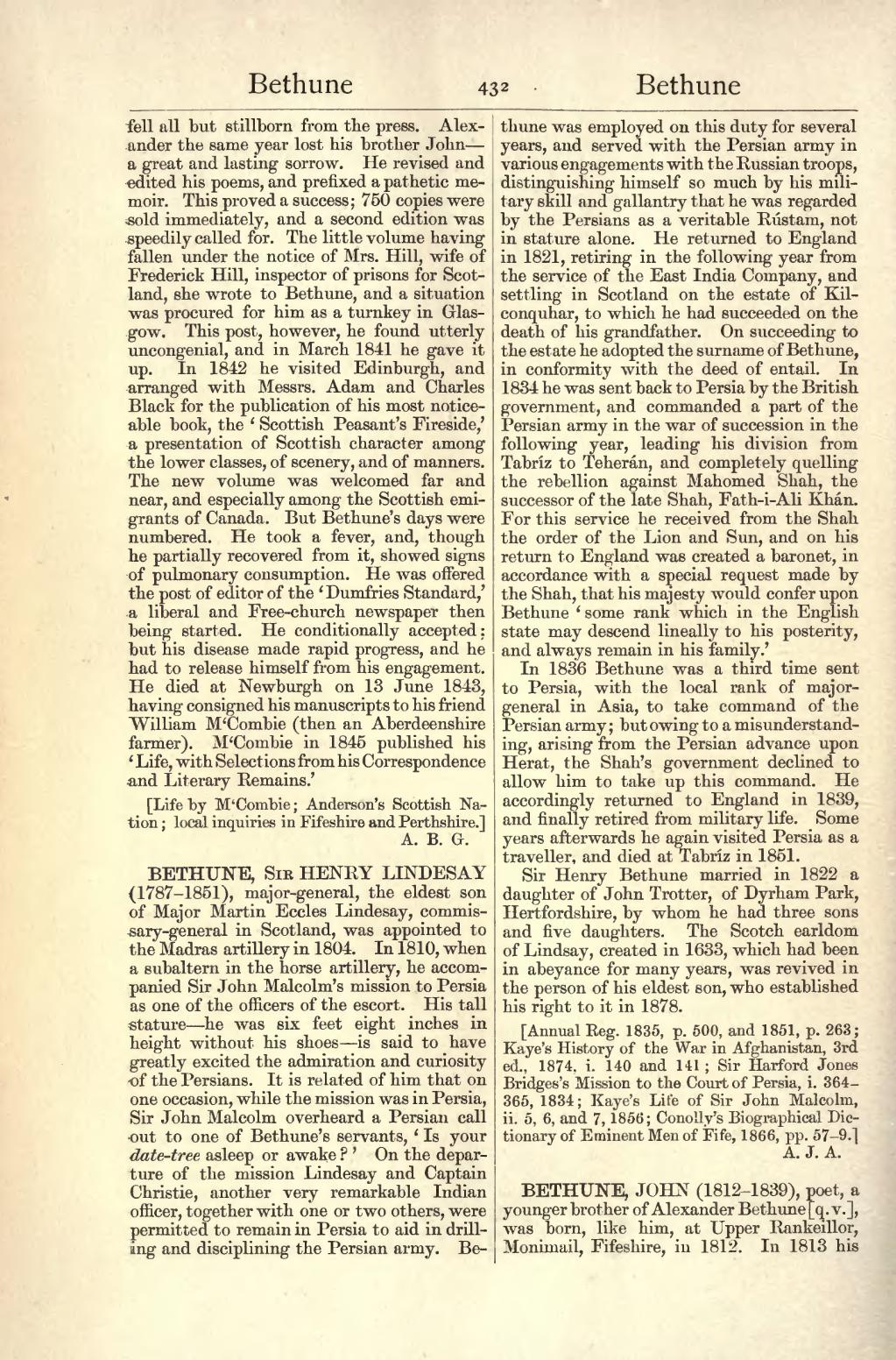fell all but stillborn from the press. Alexander the same year lost his brother John — a great and lasting sorrow. He revised and edited his poems, and prefixed apathetic memoir. This proved a success; 750 copies were sold immediately, and a second edition was speedily called for. The little volume having fallen under the notice of Mrs. Hill, wife of Frederick Hill, inspector of prisons for Scotland, she wrote to Bethune, and a situation was procured for him as a turnkey in Glasgow. This post, however, he found utterly uncongenial, and in March 1841 he gave it up. In 1842 he visited Edinburgh, and arranged with Messrs. Adam and Charles Black for the publication of his most noticeable book, the 'Scottish Peasant's Fireside,' a presentation of Scottish character among the lower classes, of scenery, and of manners. The new volume was welcomed far and near, and especially among the Scottish emigrants of Canada. But Bethune's days were numbered. He took a fever, and, though he partially recovered from it, showed signs of pulmonary consumption. He was offered the post of editor of the 'Dumfries Standard,' a liberal and Free-church newspaper then being started. He conditionally accepted; but his disease made rapid progress, and he had to release himself from his engagement. He died at Newburgh on 13 June 1843, having consigned his manuscripts to his friend William M'Combie (then an Aberdeenshire farmer). M'Combie in 1845 published his 'Lift', with Selections from his Correspondence and Literary Remains.'
[Life by M'Combie; Anderson's Scottish Nation; local inquiries in Fifeshire and Perthshire.]
BETHUNE, Sir HENRY LINDESAY (1787–1851), major-general, the eldest son of Major Martin Eccles Lindesay, commissary-general in Scotland, was appointed to the Madras artillery in 1804. In 1810, when a subaltern in the horse artillery, he accompanied Sir John Malcolm's mission to Persia as one of the officers of the escort. His tall stature — he was six feet eight inches in height without his shoes — is said to have greatly excited the admiration and curiosity of the Persians. It is related of him that on one occasion, while the mission was in Persia, Sir John Malcolm overheard a Persian call out to one of Bethune's servants, 'Is your date-tree asleep or awake?' On the departure of the mission Lindesay and Captain Christie, another very remarkable Indian officer, together with one or two others, were permitted to remain in Persia to aid in drilling and disciplining the Persian army. Bethune was employed on this dut^ for several years, and served with the Persian army in various engagements with the Russian troops, distinguishing himself so much by his military skill and gallantry that he was regarded by the Persians as a veritable Rústam, not in stature alone. He returned to England in 1821, retiring in the following year from the service of the East India Company, and settling in Scotland on the estate of Kilconquhar, to which he had succeeded on the death of his grandifather. On succeeding to the estate he adopted the surname of Bethune, in conformity with the deed of entail. In 1834 he was sent back to Persia by the British government, and commanded a part of the Persian army in the war of succession in the following year, leading his division from Tabriz to Teheran, and completely quelling the rebellion against Mahomed Shah, the successor of the late Shah, Fath-i-Ali Khan. For this service he received from the Shah the order of the Lion and Sun, and on his return to England was created a baronet, in accordance with a special request made by the Shah, that his majesty would confer upon Bethune 'some rank which in the English state may descend lineally to his posterity, and always remain in his family.'
In 1836 Bethune was a third time sent to Persia, with the local rank of major-general in Asia, to take command of the Persian army; but owing to a misunderstanding of, arising from the Persian advance upon Herat, the Shah's government declined to allow him to take up this command. He accordingly returned to England in 1839, and finally retired from military life. Some years afterwards he again visited Persia as a traveller, and died at Tabriz in 1851.
Sir Henry Bethune married in 1822 a daughter of John Trotter, of Dyrham Park, Hertfordshire, by whom he had three sons and five daughters. The Scotch earldom of Lindsay, created in 1633, which had been in abeyance for many years, was revived in the person of his eldest son, who established his right to it in 1878.
[Annual Reg. 1835. p. 500, and 1851, p. 263; Kaye's History of the War in Afghanistan, 3rd ed. 1874. i. 140 and 141; Sir Harford Jones Bridges's Mission to the Court of Persia, i. 364-365, 1834; Kaye's Life of Sir John Malcolm, ii. 5, 6, and 7, 1856; Conolly's Biographical Dictionary of Eminent Men of Fife, 1866, pp. 57-9.]
BETHUNE, JOHN (1812–1839), poet, a younger brother of Alexander Bethune [q. v.], was born, like him, at Upper Rankeillor, Monimail, Fifeshire, in 1812. In 1813 his
